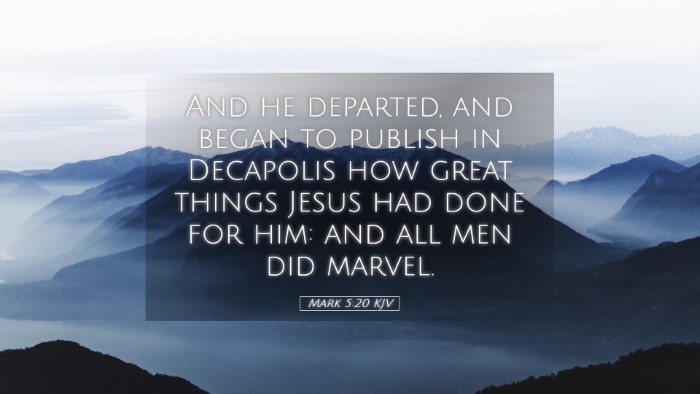Commentary on Mark 5:20
Text of Mark 5:20 (KJV): "And he departed, and began to publish in Decapolis how great things Jesus had done for him: and all men did marvel."
Introduction
The verse Mark 5:20 encapsulates a pivotal moment in the Gospel narrative where a formerly possessed man becomes a witness to the transformative power of Jesus Christ. This account occurs in the context of Jesus healing a demon-possessed man in the region of Gadarenes, highlighting not only the personal transformation of the man but also his subsequent mission to spread the message of Jesus. Commentaries from esteemed theologians such as Matthew Henry, Albert Barnes, and Adam Clarke provide profound insights into the meaning and implications of this passage.
Contextual Analysis
The setting of Mark 5:20 is crucial to understanding its implications:
- Geographical Location: The region of Decapolis refers to a league of ten cities primarily populated by Gentiles. This suggests that the man's testimony was not just for a Jewish audience, but for a more diverse populace.
- Cultural Background: The initial healing of the demon-possessed man speaks to the cultural context of spiritual warfare and the importance of personal testimony in the ancient world.
- Chronological Placement: Placed shortly after Jesus calms the storm, this event reflects Jesus’ authority over both nature and the spiritual realm.
The Transformation of the Man
Matthew Henry emphasizes the dramatic nature of the man's transformation: he who was once tormented and isolated by demons is now a proclaimer of Jesus' grace. This shift represents the core of Christian salvation — being delivered from sin and darkness to be made a herald of God’s glory.
Albert Barnes notes that this man’s life exemplifies the radical change that Jesus can enact. The transformation is not only spiritual but also practical, as he moves from being a captive of evil to a witness of redemption. His experience embodies the essence of the Gospel — bringing hope to the hopeless.
Mission of Witnessing
In Mark 5:20, we see the man’s immediate response to his healing: he begins to publish the great deeds of Jesus. Adam Clarke points out the urgency and fervor of the man's mission. His testimony starts in Decapolis, a region known for its mixed beliefs, providing fertile ground for the Gospel. The man’s proclamation acts as a form of evangelism, illustrating the importance of sharing one’s transformation as a powerful witness to others.
Henry raises a critical point about the nature of our testimonies. They are not just personal stories, but a reflection of God’s work in our lives aimed at inspiring faith in others. This aligns with Jesus’ mission of spreading the Good News — through individuals who have experienced that life-changing grace.
Responses to the Testimony
Mark 5:20 concludes with, "and all men did marvel." This reaction can be explored through various lenses:
- Astonishment: The initial marvel at the miraculous work of Jesus can evoke a sense of wonder that invites inquiry and openness to faith.
- Potential Skepticism: Within the marvel lies an opportunity for skepticism. The mixed population of Decapolis could have had varying responses to the miraculous events narrated by the man.
- Invitation to Believe: The marvel seen here serves as an entry point for faith. As the people listened and observed the transformation, they were confronted with the choice to believe or reject the claims about Jesus.
Theological Implications
This passage brings to light several key theological insights pertinent to pastors and theologians:
- The Power of Redemption: Jesus’ authority to change lives underscores the transformative power of grace that reaches even the most desperate circumstances.
- Call to Evangelism: The man’s mission illustrates that every believer is called to share their testimony, making the Gospel accessible to those who may not otherwise encounter it.
- Missional Living: Witnessing in Decapolis highlights the importance of engaging with diverse communities, reminding the Church of its call to reach all nations and peoples.
Conclusion
Mark 5:20 serves as a powerful reminder of the impact Jesus has on individual lives and the subsequent mission to share that transformation with the world. The union of personal testimony and public proclamation embodies the heart of the Christian faith. As seen through the insights of Matthew Henry, Albert Barnes, and Adam Clarke, this passage is not merely a historical account but a challenge to every believer to embrace their role as a witness in a world yearning for hope and redemption.


